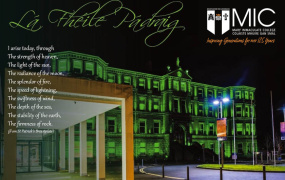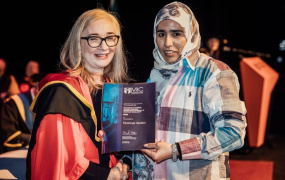Pre-Departure
Before you Go
There are many practical considerations before you travel to Mary Immaculate College to begin your studies.
Essential Documents
EU/EEA Citizens
- Passport
- European Health Insurance Card (EHIC), available from your local health authority
- Acceptance letter from Mary Immaculate College
Non EU/EEA Citizens
- Passport (with visa, if required)
- Private Health Insurance
- Acceptance letter from Mary Immaculate College
- Evidence of payment of fees
Health Insurance
Nationals of the European Economic Area (EEA*)
Students on a temporary stay in Ireland are entitled to public healthcare that may become necessary during their stay in Ireland on production of a European Health Insurance Card (EHIC) or equivalent. To avail of public health services, you must attend a doctor who is registered with the General Medical Scheme (GMS). Medication prescribed by this doctor may be obtained, free of charge, from any local pharmacy. This scheme does not cover any medical condition that existed prior to the student arriving in Ireland. If hospital treatment is required, you should attend the nearest hospital’s Accident and Emergency Department and present your EHIC or equivalent.
Under the General Medical Scheme in Ireland, for non-emergency cases, there may be a delay in obtaining an appointment with a specialist doctor and in obtaining hospital treatment. Persons who have private medical insurance can usually obtain such treatment more speedily. Any students wishing to obtain private health care are advised to do so before coming to Ireland.
*The European Economic Area (EEA) comprises the 28 EU member states: Austria, Belgium, Bulgaria, Croatia, Cyprus, Czech Republic, Denmark, Estonia, Finland, France, Germany, Greece, Hungary, Ireland, Italy, Latvia, Lithuania, Luxembourg, Malta, Netherlands, Poland, Portugal, Romania, Slovak Republic, Slovenia, Spain, Sweden, United Kingdom and the non-EU member states: Norway, Iceland, Liechtenstein and Switzerland.
Non-EEA Nationals
Students from countries outside of the European Economic Area (EEA) are required to have private health insurance before coming to Ireland
Private Health Insurance options:
*Please note that while we include links to private insurance companies below, MIC does not endorse or recommend any particular one*
Study and Protect:
Study & Protect, a specialist international student insurance broker, provide a comprehensive health insurance offering by Irish Life Health called ‘Study in Ireland’. More information about Study & Protect can be found here. Please note, they do not provide multi-year plans.
Other Health Insurance options from the following Irish insurance companies include:
Visa & Immigration Information
Pre-Arrival Visa Requirements
Citizens of certain countries require an entry visa for Ireland. Please check with the Irish Naturalisation and Immigration Services (INIS) if a visa is required.
How to Apply
Visa applications must be made online using the INIS AVATS online facility. The online application and any documentation requested must be submitted prior to a visa application process commencing. Please note the following requirements:
- Passport must be valid for 12 months
- Evidence of private health insurance*
- Evidence of an offer to study at Mary Immaculate College
- Evidence of payment of tuition fees
- Evidence of sufficient funds to cover living expenses
*Purchase a health insurance plan with 12 months cover here.
It is advisable to apply for a visa as early as possible as it can take at least 8 weeks to process. It is possible to check if a visa has been processed at INIS Visa Decisions, which is updated weekly.
Post-Arrival Immigration Requirements
EU/EEA Nationals
Citizens of the EU/EEA are not required to present themselves to the immigration authorities in Ireland.
Non-EU/EEA Nationals
All non-EU/EEA citizens are subject to immigration controls at the point of entry to Ireland. An immigration official will stamp a date of either 1 or 3 months from the entry date, requiring registration with the Garda National Immigration Bureau (GNIB) in Limerick within that time period.
In addition to your passport (with visa, if required) it is essential to have your acceptance letter from Mary Immaculate College, evidence of funding available and fees paid, and evidence of private health insurance available for inspection by the immigration official.
Registering with the Immigration Service Delivery Registration Office
A new system was introduced in July 2024 which requires all immigration appointments to be scheduled with the Immigration Service Delivery Registration Office in Dublin. You will be required to travel to the Dublin-based office for your set appointment date and time. Please note that there is no negotiation on this date and time, you have to attend the date and time you are given. You will NOT be penalised for missing class if it is on an academic date. You are required to make this appointment yourself, as unfortunately, we cannot make it for you due to GDPR (data protection rules).
First time applicants residing in Limerick will be required to register their immigration permission at the Immigration Service Delivery Registration Office located at 13/14 Burgh Quay, Dublin 2, D02 XK70.
Appointments can be booked through their new Online Portal.
For the booking process, you will need your passport to hand, and the details of a valid email address.
For your appointment, you will need
- Valid passport (with entry visa if required)
- Letter of acceptance from Mary Immaculate College (provided by the International Office)
- Evidence of private medical insurance
- Evidence of access to sufficient funds to cover living expenses
- Lease agreement as proof of address
- A credit/debit card for payment of €300 registration fee
Following registration with the Immigration Service Delivery Registration office, an Irish Residence Permit (IRP) will be issued, which is valid for one year, or one semester, whichever is applicable. If you wish to leave and return to Ireland within this period, you will be able to show your passport and IRP card to prove to airlines and immigration officials that you have a right to travel to Ireland. The IRP card must be renewed each year by the expiry date.
Application Process for the 1G (graduate) Visa
Students can only apply for their 1G visa when they successfully complete their studies and after the official publication of the final results.
To apply for a 1G visa students must meet the following requirements:
- Reside in Ireland
- Have a valid IRP card
- Hold a level 8 or level 9 award
- Apply within six months of being notified of the award
- Not have exceeded the seven-year limit on a Stamp 2 Visa or the eight-year limit on a Stamp 2 + Stamp 1G visa
From 4 November 2024 all students (regardless of where they live in Ireland) can renew their visa online and renewals are processed on the immigration application portal.
Processing times may take 4-8 weeks.
| Documents Required for Application |
|---|
| 1. Passport The biometric page of your current valid passport(s). This is the page that shows your photograph, passport number and date of birth. |
| 2. Current IRP card The front and back of your current IRP card. This is the credit-card sized plastic card you received when you last registered your permission. |
| 3. MIC Graduate Visa Letter Proof you successfully completed your third level course. The MIC Graduate Visa Letter can be requested directly from International@mic.ul.ie once final results have been published. |
| 4. Health Insurance from an Irish Provider Private Medical Insurance or Travel Insurance with medical cover for accidents and medical incident including hospital stays in Ireland, valid for 12 months, or if less than 12 months for the duration of your stay. See the MIC website for advice on Health Insurance. |
| 5. €300 to pay by credit/debit card |
How to Apply
Students must apply for the Stamp 1G through the application portal here.
- Select Registration and Registrations Renewal
- Select Registration Renewal
- Complete the form and in the section Immigration Permission/Permission type for renewal select Stamp 1G or 1A
- Complete the application and submit uploading all supporting documents and pay the fee
Other Recommendations
- Graduates who previously benefited from the 1G visa (Third Level Graduate Programme) at a level 8 award or above, on achievement of a higher level award, for example level 9 or above, can re-enter the Third Level Graduate Programme for an additional period of 12 months, subject to the overall limit of eight years. Also, graduates will not be permitted to access the programme on more than two separate occasions.
- Graduates with a Level 9 award will be granted the 1G visa for 12 months initially. This can be renewed for a further period of 12 months (subject to the overall eight-year limit on the student conditions (stamp 2 and stamp 1G) not being exceeded and where the graduate satisfies the immigration authorities that they have taken appropriate steps to access suitable graduate level employment e.g. show evidence of attendance at job interviews, signing up with graduate employment agencies.
- See the immigration website for the most up to date list of required documents - immigration website.
- Transcripts are not required for 1G Visa applications. Transcripts are issued to students by the Exams team. If you do require a copy of your transcripts and/or award document, please the Transcripts and Electronic Award Documents.
Working in Ireland
Students attending a full-time programme at Mary Immaculate College for one year are entitled to work part-time, up to 20 hours per week, during academic terms and full-time, up to 40 hours per week, during college holidays. Please see the academic calendar for details of term dates.
Students attending MIC for one semester are not permitted to work.
Personal Public Service Number (PPS)
Similar to a Social Security Number, or other tax identification number, a PPS number is required to register with the Irish tax authority, Revenue, and to work in Ireland.
Students must attend the Intreo Centre in Limerick to apply for a PPS number and provide the documentation outlined below.
EU/EEA Students
Students from the EU/EEA can work in Ireland without a work permit, but must apply for a PPS number. The following documentation is required:
- Passport
- Proof of address, such as a utility bill or bank statement
- Evidence of a job offer e.g. an offer letter
Non-EU/EEA Students
Full-time Non-EU/EEA Students can work up to 20 hours per week during term time and up to 40 hours during holiday periods. Students studying for just one semester cannot work while in Ireland. When applying for a PPS number, the following documentation is required:
- Passport
- Irish Residence Permit (IRP) previously know as GNIB card
- Mary Immaculate College student card
- Proof of address, such as a status letter from Mary Immaculate College, utility bill or bank statement
- Status letter from Mary Immaculate College
- Evidence of a job offer e.g. an offer letter
Please contact international@mic.ul.ie with any questions.
- Before you Go
- Health Insurance
- Visa & Immigration Information
- Working in Ireland







